While Fairweather Fans Come and Go, Britney Spears' Queer Fans Will Never Leave Her Alone
Note: This post contains mentions of suicide.
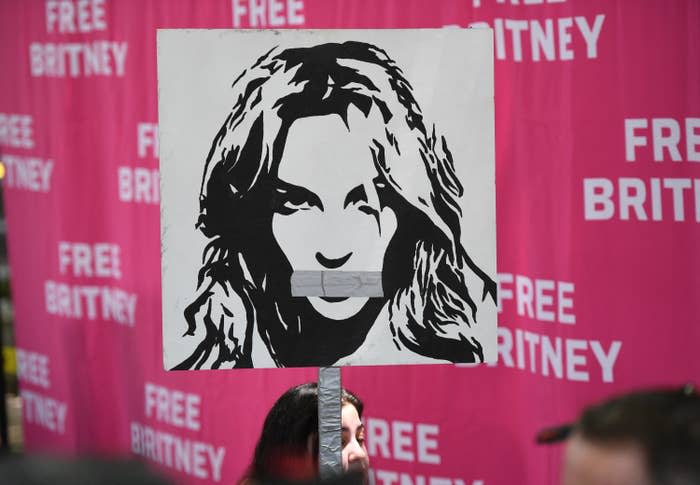
A woman holds a poster of Britney Spears with her mouth taped shut as fans and supporters gather outside the Los Angeles County Courthouse in 2021.
For most of Britney Spears' 13-year conservatorship, almost no one was saying "Free Britney."
Until a couple years ago, the common line of thinking was that placing the pop icon under a conservatorship in 2008 saved not only her career, but also her life. Only Spears' most devoted fans (or "stans") rang the alarm that perhaps she was being exploited, discussing the possibility in online forums between debates about the hidden gems in Spears' consequential discography (my two cents: 2011's "How I Roll" is fizzy perfection).
In 2020, though, something shifted. The hashtag #FreeBritney started making regular appearances in Twitter's trending column, explainer videos suggesting she was a prisoner in her own life racked up millions of views on TikTok, and news media took notice. Very quickly, "Free Britney" went from fringe fan concern to mainstream maelstrom. Why did so many non-stans suddenly start taking it seriously?
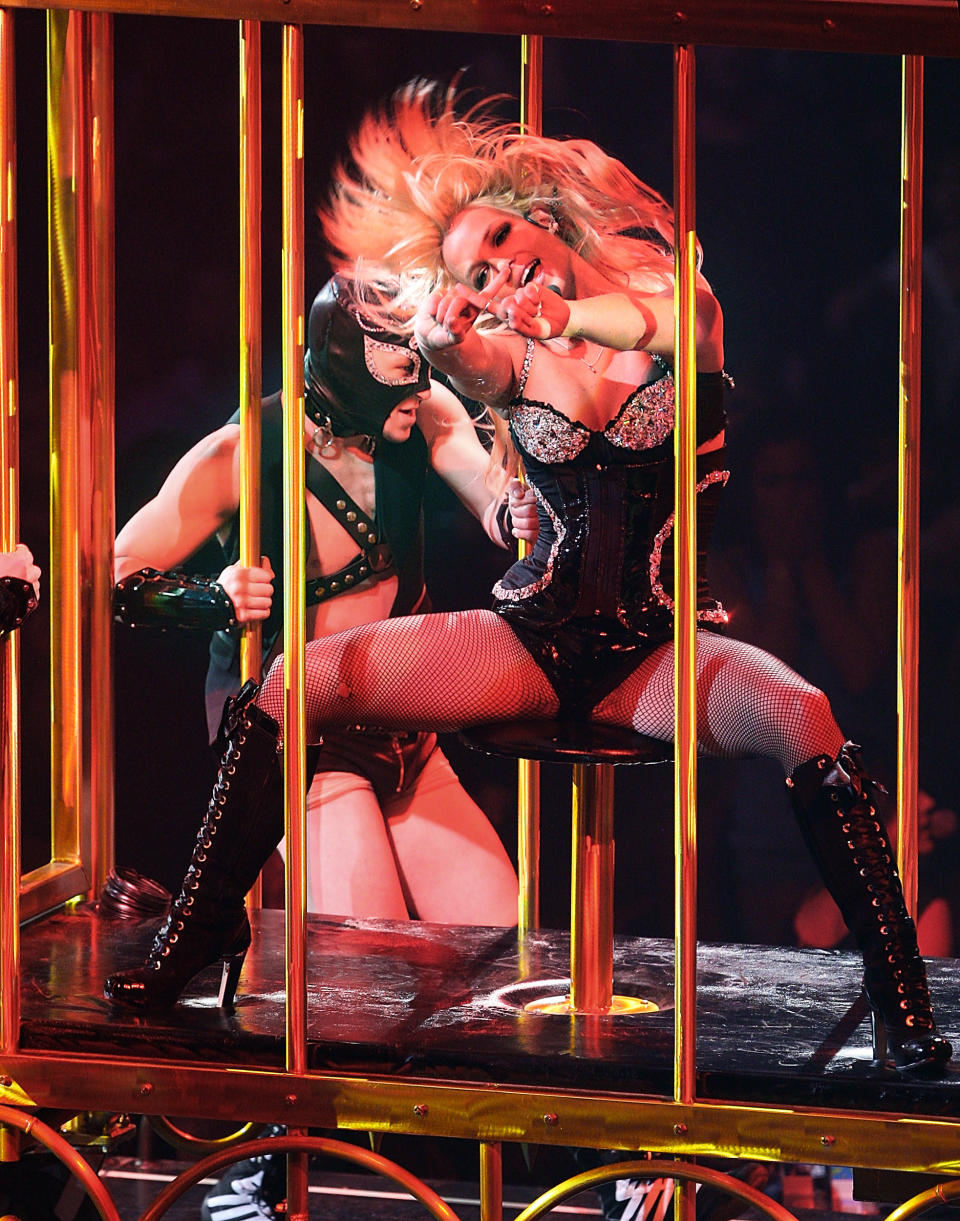
Spears performs during her The Circus Starring Britney Spears Tour in 2009.
For one thing, the culture that had allowed her conservatorship to go largely unquestioned changed enough to invite more introspection about Spears' treatment, both now and in the past. Sure enough, after the New York Times documentary Framing Britney Spears premiered in early 2021, my Twitter timeline lit up with people reevaluating Spears' late '00s takedown — and their own complicity in it.
Second, cracks began to form in the veneer of the Spears machine. Suspicions about how much of a say she had in her activities had dripped among stans for years, but they overflowed in April 2019 when an Instagram post meant to dampen concerns that Spears had been checked into a mental health facility against her will inflamed them instead. After that, even casual fans started speculating, and by 2020 "Free Britney" had become a viral rallying cry.
But while these two factors played a major role, I suspect that a big part of what allowed "Free Britney" to transcend its conspiracy theory status was what was going on with us, not her. In 2020, millions around the world were forced to stay home and social distance. I imagine many of them began to see their own frustrations and anxieties — their lack of control, their isolation — reflected in the restrictions Spears had been enduring for more than a decade. Perhaps rooting for her freedom felt like rooting for their own.
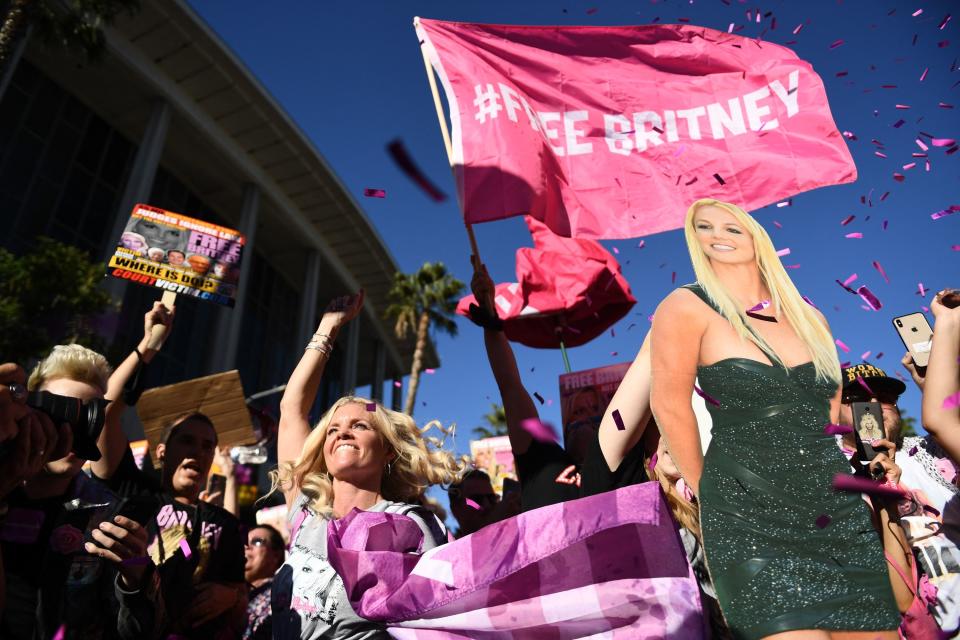
Supporters of the #FreeBritney gather outside a conservatorship court hearing in 2021.
Though the surge of support for Spears over the last few years has been deeply heartening, those who began championing her more recently are exceptionally late to a solidarity her stans have felt for years. While some casual supporters may have needed a pandemic to empathize, a lot of Spears' most die-hard fans belong to groups for whom restrictions are nothing new.
Turn around at a Spears show (a tall order when she's commanding the stage), and you will see an abundance of LGBTQ people, as well as a large number of women, people of color, and individuals with mental illness. Long before lockdown, these fans saw their struggles — and their perseverance — reflected in Spears'.
I am one of them. Like a lot of Spears fans, I'm queer, and I also live with mental illness. But even I didn't understand the full extent of why many people belonging to marginalized communities see themselves in Spears until more recently.
In December 2019, I received a scheduled email from a dear friend, Alex, informing me that he had ended his life. His note included words of love and explanation, but also something else. Alex, who had depression, was the biggest Spears fan I've ever known, and loving her was central to our friendship. He was also a jester of sorts, always sending me things that were either absurd jokes or even more absurd realities. In his goodbye email, he left one last thing that straddled this boundary of believability: a set of audio recordings of him talking to someone he met on one of the Spears fan forums that birthed "Free Britney." Someone who sounds remarkably like Spears herself.
As many Spears fans spent 2020 trying to decipher the meaning of her Instagram captions, I was going down a digital rabbit hole of my own, attempting to understand why he had sent me these clips. In 2021, I released a four-episode podcast series, Unread, that documents this journey. While making it, I gained not only a better understanding of my friend, but also a greater sense of why Spears meant so much to him and the other stans who gather in those forums.
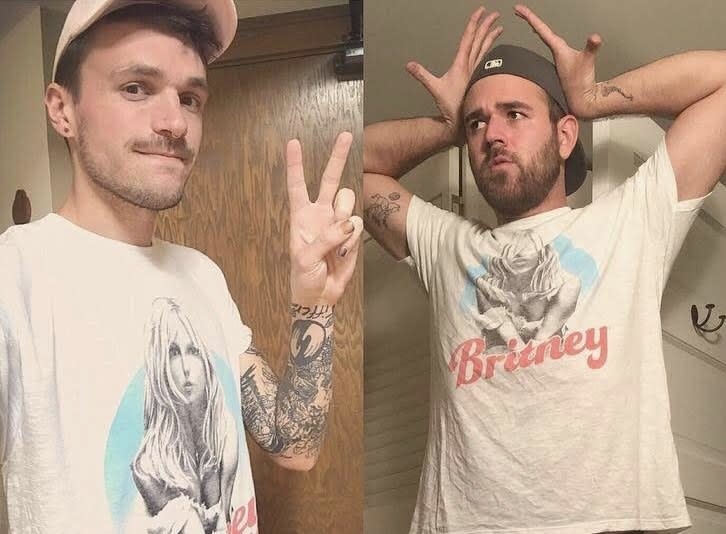
Chris Stedman (left) and his friend Alex (right) pose in matching Spears shirts in 2017.
For Spears devotees, the draw isn't the precision of her dancing, the way she can contort her voice to sound like something from the future, or the incredible songwriting skills behind her devastating ballad “Everytime.” Or, it isn't only those things. It's also how human she is; how, in an age of artifice, she feels so real.
From the way it seems like she's the only celebrity that doesn't employ a social media team to write out carefully curated captions, to the fact that she has stepped out of the house with exposed extensions for years, stans see ourselves and our own messy humanity in her. Celebrating the imperfections that people have criticized Spears for again and again has become just as central to being her fan as the jaw-dropping talents that have earned her awards and acclaim.
There's something truly special about how much fans can see themselves in Spears — how she makes so many people feel less alone just by being her fierce, flawed self. She did this for Alex, and she does it for me. But if we aren't careful, we run the risk of overidentifying to the point that we begin imposing our own ideas about what is right onto Spears, stripping her of her humanity in the process. It's one thing to root for Spears. It's another to project your particular anxieties onto her, and turn on her when she deviates from what feels relatable or acceptable to you.
I see worrying signs of this already. Some of the people who once cried "Free Britney" now suggest she might be a little too free. Below her Instagram posts, a number of commenters have begun taking issue with her lengthy, free-association captions (to me they're as much evidence for her writing brilliance as "Everytime") or the occasional near-nude selfie (as if she has never been photographed in the buff before).
Spears may no longer be under a conservatorship, but she's still subject to the whims of a fickle public that’s already saying "that free britney thing might've been a mistake." Perhaps it's not incidental that this turn against Spears is happening as a number of people are returning to the office and resuming in-person happy hours. If you no longer need Spears as an avatar, you can go back to picking her apart.
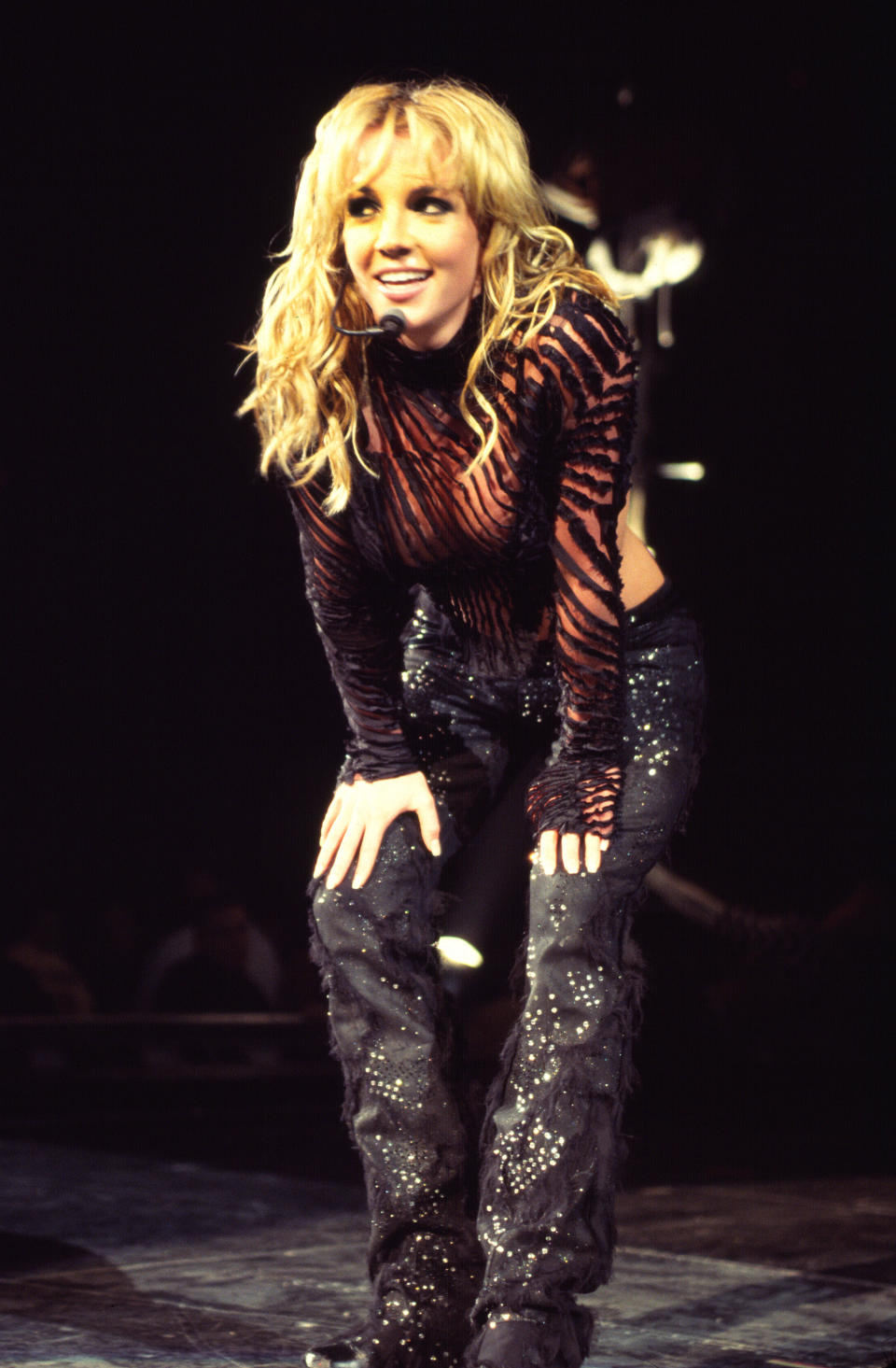
Spears performs onstage during her Dream Within a Dream Tour in 2001.
I was once part of the anti-Spears chorus. Internalized homophobia made me dismissive of pop music growing up — because divas are revered in queer culture, and because I was unable to see my fearful self reflected in something so flamboyant and free. Then, in 2007, I watched a video that was supposed to make me laugh. In it, a sobbing fan asked the world to "leave Britney alone."
Before, I had relished in the jokes made at Spears' expense. But this video shocked me awake. I finally understood that judging Spears wouldn't keep me safe. That the people who laughed at her when she was down had been doing the same to me for most of my life. And so, cracked open, I embraced her instead (just in time too — shortly after that, she released one the best albums ever made, Blackout).
As it turned out, embracing Spears had an unexpected benefit: It helped me embrace more of myself too. Though I'd been out as queer for years, the compartmentalizing I'd learned in the closet proved harder to shake, and I still struggled to share the messier parts of myself. But if Spears could be so iconic while also being so human, perhaps I could learn to be less afraid of the parts I'd been tucking away too. Sure enough, when I met Alex a couple of years later, I found someone who not only loved Spears as much as I did, but who also loved me — all of me. He wanted nothing more than for me to be my full self, just like he wanted for Spears.
I'm glad that in 2020 a lot more people caught up with the perspective of Alex and the viral video that put me on the path to knowing him. As Spears enters the post-conservatorship stage of her public life two years later, that video is worth revisiting. "Leave Britney Alone" was originally a rallying cry against the harassment she was enduring from a world that judged her every move. But Spears deserves more than the peace of being left alone; she deserves understanding.
It doesn't seem that Spears wants to be left alone anyway — she's been sharing more than ever lately, primarily through Instagram, though a book is coming as well. After a decade, perhaps a lifetime, of being silenced, she has every right to be heard on her own terms, whether it's through unfiltered Instagram captions or unclothed selfies. But as people look and listen, I hope they will follow the lead of the stans who first saw Spears as fully human. People like my friend Alex, who knew better than most what it's like to be embraced at your highest and judged at your lowest.
I see so much of Alex in Spears, who he defended and rooted for long before most of us. Every time she posts on Instagram, I feel a twinge of bittersweet hope that the world might offer her the understanding Alex didn't always get.
Fortunately for Spears, long after casual supporters have either moved on or rescinded their sympathies, the stans who have always accepted her without judgment will still be there, refusing to leave Britney alone.
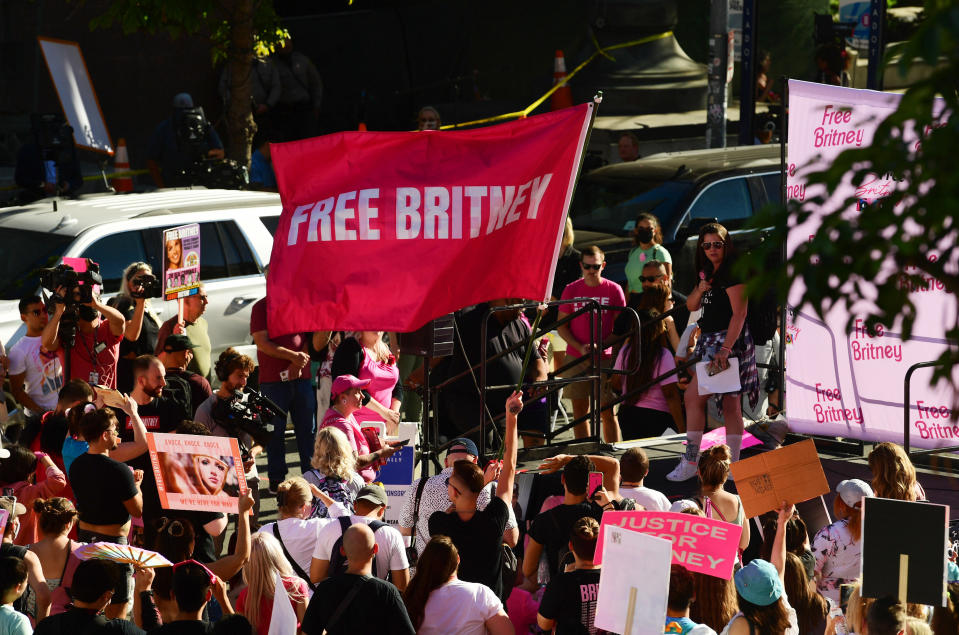
#FreeBritney supporters gather outside the Stanley Mosk Courthouse in 2021.
The National Suicide Prevention Lifeline is 1-800-273-8255. Other international suicide helplines can be found at befrienders.org. The Trevor Project, which provides help and suicide-prevention resources for LGBTQ youth, is 1-866-488-7386.
The National Alliance on Mental Illness helpline is 1-888-950-6264 (NAMI) and provides information and referral services; GoodTherapy.org is an association of mental health professionals from more than 25 countries who support efforts to reduce harm in therapy.
Chris Stedman is the writer and host of "Unread," named one of the best podcasts of 2021 by the Guardian, Vulture, HuffPost, the CBC, and others. He is also an author, most recently of "IRL," and teaches in the department of religion and philosophy at Augsburg University in Minneapolis, Minnesota.